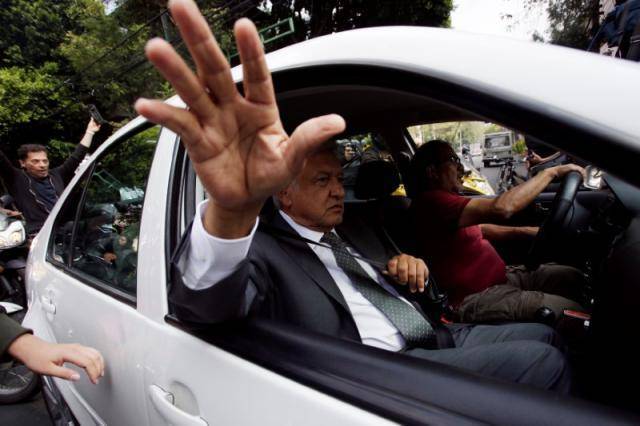Mexico’s political establishment has been toppled with the election of populist leftist presidential candidate Andrés Manuel Lopez Obrador, commonly known by his initials as AMLO. With about 94 percent of the ballots counted Tuesday, he had 53 percent of the vote in a four-person field. His nearest challenger had less than half that.
AMLO’s left-wing National Regeneration Movement (MORENA) will now hold the plurality of seats in both houses of Congress as a result of Sunday’s election. MORENA is expected to forge an alliance with a small social conservative party and the leftist workers party to form a new governing coalition in Congress.
This marks the first time since Mexico’s transition to democracy where a third party will call the shots.
But in spite of AMLO’s massive victory, there is much uncertainty about how his administration will govern. He campaigned on addressing government corruption, insecurity, and poverty – but provided little indication of just how he will achieve his goals.
This same uncertainty spills over into the U.S-Mexico relationship. While at times critical of U.S. policy, AMLO’s campaign was never anti-American. His election presents a few challenges, but also a renewed opportunity to reset bilateral relations.
As with many countries in Latin America, immigration policy will undoubtedly be an area of disagreement with the Trump administration.
During his victory speech, AMLO said he wanted a relationship with the U.S. “rooted in mutual respect and in defense of our migrant countrymen who work and live honestly in that country." He has also previously said he will not do the U.S.’s “dirty work” of stopping Central Americans from trying to enter America.
This may have been political grandstanding. If not, it would present a significant problem for the Trump administration. Since the 2014 border crisis, Mexico has ramped up its efforts to repatriate Central Americans crossing its borders. In 2017, Mexico sent 78,300 Central Americans back home. In the first four months of this year, it deported 35,000.
Certainly, the U.S. should anticipate reduced cooperation from Mexico on regional challenges like the Venezuela crisis. Under the current government of President Enrique Peña Nieto, Mexico became a regional leader in holding the Venezuelan regime accountable.
AMLO intends to return Mexico’s to a more noninterventionist policy. This will be a significant setback to U.S. diplomatic efforts throughout the region.
And U.S. investors remain concerned about AMLO’s anti-free-market rhetoric. A tepid supporter of the North America Free Trade Agreement (NAFTA), his nationalist economic agenda calls for reviving industries like agriculture that have been rendered uncompetitive by free trade.
AMLO also campaigned on rolling back key energy reforms and expanding welfare programs. Yet his economic advisers have painted a different picture of the president-elect’s policies. At times, he and his chief economic adviser have publicly contradicted one another on energy policy.
The financial markets indicated apprehension about AMLO on Election Day. The orderly electoral process kept the peso steady – until exit polling showed AMLO’s coalition would have a majority in Congress. That triggered a quick decline.
AMLO’s economic development agenda could materialize in many forms. He could expand Mexico’s already bloated welfare state and leave it at that. In the worst-case scenario, he might completely restructure Mexico’s open economy.
Yet there is widespread belief that budgetary constraints will lead AMLO to create conditions for economic growth rather than increase the public debt, which already stands at 46.4 percent of Mexico’s gross domestic product (GDP).
Shortly after AMLO’s election victory, President Trump tweeted his congratulations to the president-elect. Despite areas of disagreement, there is room for cooperation between the two leaders. Both were elected by constituencies largely overlooked by the economic and political elite. Like President Trump, AMLO wants a NAFTA deal that helps the people whose economic circumstances have declined in recent years.
Both countries have a shared interest in combatting drug trafficking and crime. Violence in Mexico reached historic and insufferable highs last year under the government of Peña Nieto. This election cycle has been the most violent on record, with over 130 political assassinations since last September. Drug cartels and other criminal organizations are behind much of the bloodshed.
AMLO has a mandate to set his country on the right track. His party will now have control of Congress and the support of a people fed up with the status quo.
In addition, AMLO has a counterpart in the U.S. dedicated to addressing the region’s security crisis. Both countries should focus on advancing areas of mutual interest and working productively through disagreements.
Fox News
More about:
















































